Are you struggling to attract the right RV buyers to your website? In today’s competitive market, understanding how your customers search online is the key to more traffic, leads, and sales.
This ultimate guide to keyword research will show you exactly how to find the keywords that drive RV buyers to your dealership—and how to avoid costly mistakes that waste your ad budget.
By the end of this guide, you’ll have a clear roadmap to:
- Target the right buyers at every stage of their journey
- Avoid common keyword research mistakes
- Boost your website traffic and sales with RV-specific keywords
Plus, don’t miss out on our FREE RV Dealer Keyword Research Report—a powerful tool to kickstart your SEO strategy.
Let’s dive in.
1. What is SEO Keyword Research?
SEO, or Search Engine Optimization, is the art and science of making your website more appealing to search engines like Google. Keyword research is the foundation of SEO. It’s about finding the words and phrases (keywords) your potential customers use when searching for RVs and related services.
Imagine you’re a potential RV buyer. Your journey begins with a simple Google search: “Best RVs for family travel.” The words you type into that search bar are keywords. For RV dealers, understanding these keywords is like having a map to guide buyers straight to your dealership.
2. The RV Buyer’s Journey: Understanding Search Intent
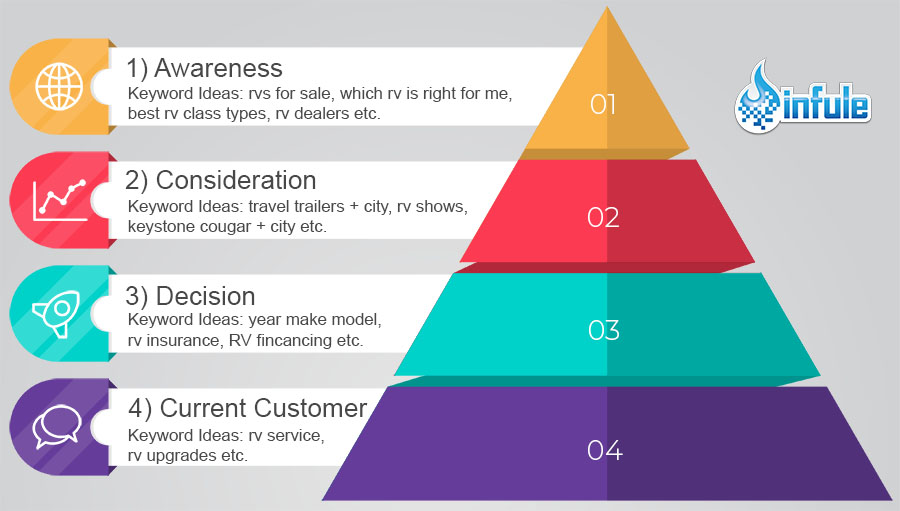
To master keyword research, you need to understand the RV buyer’s journey. This journey can be broken down into several stages, each requiring a different set of keywords:
- Awareness Stage: Buyers use generic keywords like “RVs for sale” or “RV dealers.” They’re gathering information and may not be ready to buy yet.
- Consideration Stage: Buyers narrow down their options with searches like “travel trailers for sale” or “motorhomes.”
- Decision Stage: Buyers search for specific brands or models, such as “Airstream Flying Cloud 23FB for sale” or “RV financing near me.”
- Retention Stage: After purchase, RV owners search for topics like “RV storage” or “popular RV upgrades.”
Your keyword strategy must align with each stage of this journey to effectively reach your audience.
3. Types of Keywords Every RV Dealer Should Target
Not all keywords are created equal. Here’s a breakdown of the types of keywords that matter most for RV dealers:
- Short-Tail Keywords: Brief and generic, like “RV dealers.” High search volume but highly competitive.
- Long-Tail Keywords: Longer and more specific, like “family-friendly RVs for sale near Dallas” or “single axle travel trailers” or “fuel efficient fifth wheels”. Lower competition and higher buyer intent.
- LSI Keywords (Latent Semantic Indexing): Semantically related keywords, such as “camping gear” or “RV parks” for the keyword “RV camping.”
4. Step-by-Step Keyword Research Checklist for RV Dealers
Here’s a quick, actionable checklist to help you get started:
- Brainstorm Initial Keywords: Think about what your customers might search for (e.g., “RV financing,” “RV storage near me”).
- Use Keyword Research Tools: Plug your ideas into tools like Google Keyword Planner, SEMrush, or Ubersuggest.
- Focus on Long-Tail Keywords: Target specific phrases like “small travel trailers for sale in Texas.”
- Analyze Competitors: Use tools like Ahrefs or SEMrush to spy on your competitors’ keywords.
- Organize Keywords by Buyer Stage: Group keywords into Awareness, Consideration, Decision, and Retention stages.
- Track and Optimize: Monitor your keyword performance and adjust your strategy as needed.
5. Tools to Supercharge Your Keyword Research
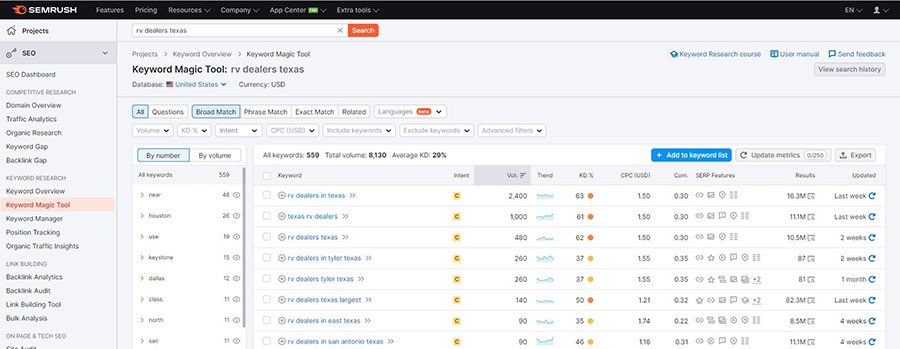
To start keyword research, you’ll need the right tools. Some popular options include:
- Google Keyword Planner: It’s free and provides insights into search volume and competition for keywords.
- SEMrush: A comprehensive SEO tool that offers keyword research, competitive analysis, and more.
- Ahrefs: Known for its backlink analysis, Ahrefs also provides excellent keyword research capabilities.
- Ubersuggest: Has a great free version in order to get started in your research.
- AlsoAsked.com – free keyword ideas based upon questions.
- Google suggest – After you find some keywords, type them into Google and scroll down to find common questions, then copy those to your spreadsheet.
These tools will help you uncover valuable keywords specific to the RV industry, enabling you to tailor your content and website optimization accordingly.
6. Building an RV-Specific Keyword List
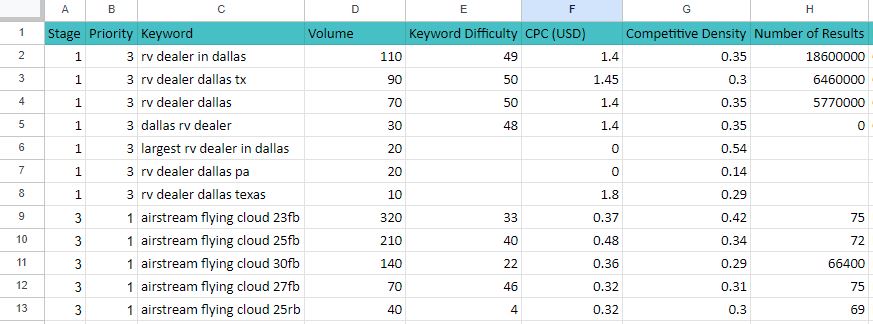
Your goal here is to create a list of keywords relevant to your RV dealership. Start by brainstorming the keywords potential buyers might use at each stage of their journey. Then, use keyword research tools to expand your list.
As an RV dealer, location is essential. Incorporate location-based keywords, like “RV dealers in dallas.” These are particularly valuable for attracting local customers.
Prioritize your keywords based on search volume, competition, and relevance. Focus on long-tail keywords that align with the buyer’s journey.
Google Sheets
When it comes to building your RV-specific keyword list, organization is key. We highly recommend creating a dedicated Google spreadsheet to manage your keywords effectively. This approach offers the flexibility and collaboration tools your dealership needs for successful keyword management.
Here’s how you can structure your keyword list in the spreadsheet:
- Keyword: In the first column, list the keywords or keyword phrases you’ve identified. Be sure to include variations and long-tail keywords to cover a wide range of search queries.
- Priority: In the second column, assign a priority level to each keyword. Use a scale from 1 to 5, with 1 being the highest priority. This helps you focus on optimizing the most critical keywords first.
- Stage: The third column should indicate the stage of the customer buying process associated with each keyword. Assign keywords to one of these stages: Awareness, Consideration, Decision, or Retention. This allows you to tailor your content and strategies to match where potential customers are in their journey.
By structuring your keyword list this way, you’ll have a clear roadmap for your SEO efforts. It helps you prioritize keywords, target specific stages of the buying process, and track your progress over time. Plus, with Google Sheets’ collaborative features, your team can work together seamlessly to optimize your RV dealership’s online presence.”
This addition provides a practical approach for RV dealerships to organize their keyword lists and highlights the benefits of using Google Sheets for this purpose.
7. Competitor Analysis
When it comes to keyword research, understanding what your competitors are doing is just as important as finding the right keywords for your RV dealership. This is where competition keyword analysis comes into play.
View the keyword report that we pulled from Vogt RV, you can see what keywords associated with their domain, their ranking, traffic to their site and overall keyword traffic. The report will give you valuable insight into keyword that they have that you need to add to your keyword spreadsheet.
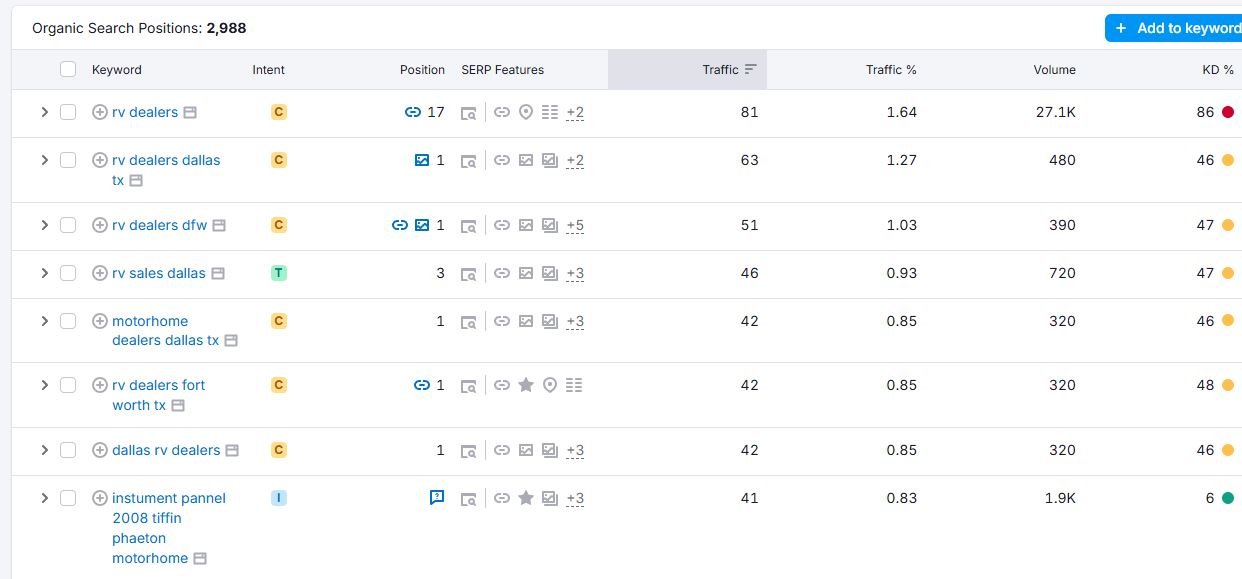
In Addition to the keywords that drive them the most traffic, it also gives us an idea on keywords that generate traffic that are VERY easy to rank for. KD% in this image is Keyword Difficulty. 100 being very competitive (think ranking #1 for Credit Cards) and 0 being not competitive at all. Check this out:
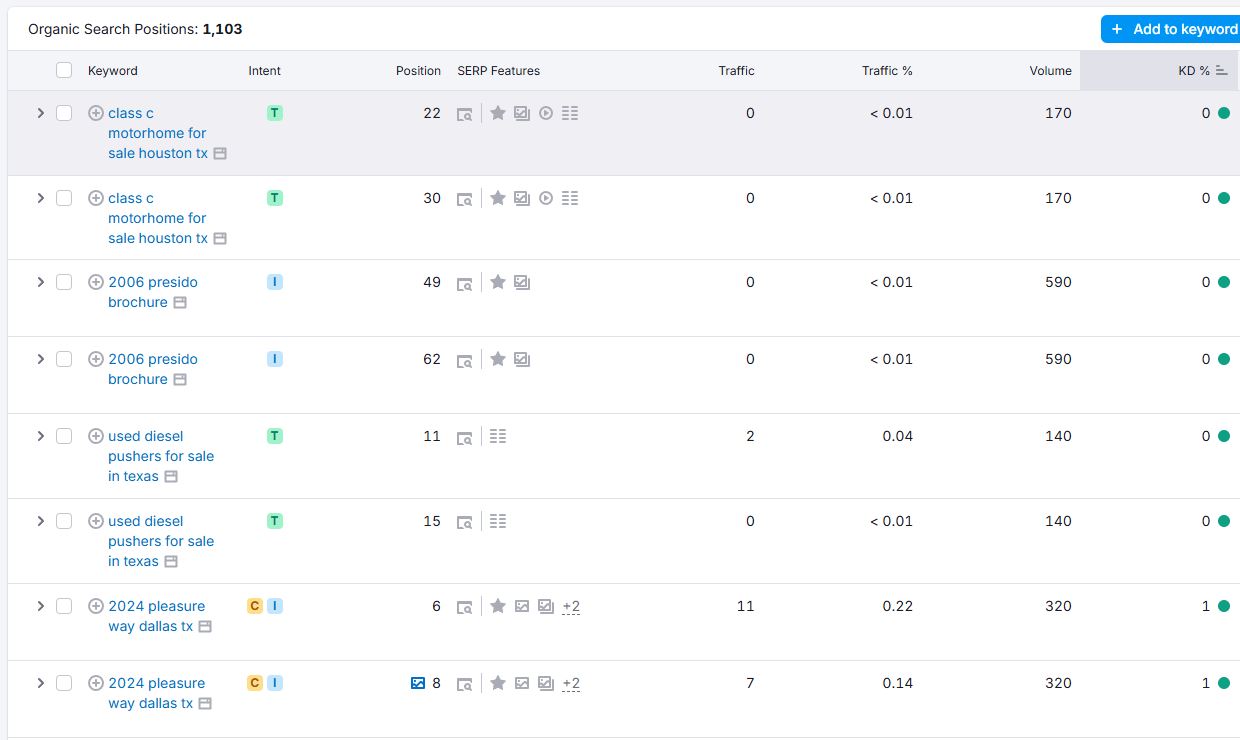 140 visitors typed: used diesel pushers for sale in texas. My fingers got tired at the end of that 🙂
140 visitors typed: used diesel pushers for sale in texas. My fingers got tired at the end of that 🙂
But that is an example of a long-tail keyword that has 0 competition and would be really easy to rank for. And, this is one of MANY that showcases the value of keyword research.
Why is Competition Keyword Analysis Important?
- Identifying Competitor Strategies: By examining your competitors’ keyword choices, you can get a clearer picture of their content strategy and their target audience (ahem… and your audience). This knowledge can help you refine your own strategy and find opportunities they might have missed.
- Discovering High-Performing Keywords: Competition analysis can uncover high-performing keywords that you may not have considered. If your competitors are consistently ranking well for certain keywords, it’s a strong indicator that these keywords are valuable in your industry.
- Identifying Keyword Gaps: By comparing your keyword list with your competitors’, you can identify gaps in your content. These are keywords that your competitors are ranking for, but you’re not. Filling these gaps can be an effective way to capture more search traffic.
View this entire article on RV Dealer competition analysis:
Don’t overlook your competitors. Analyzing their keywords can provide invaluable insights. Tools like SEMrush and Ahrefs allow you to spy on your competitors and discover the keywords driving traffic to their websites.
By understanding what keywords your competitors are targeting, you can identify gaps in your strategy and areas where you can outperform them.
8. Implementing Keywords in Content
Once you’ve amassed your keyword arsenal, it’s time to deploy them strategically:
- Create a content calendar – Nothing happens with a plan. Take your keywords, sort by priority and create a task list of implementing changes to your site.
- On-Page SEO: For keywords that you already have a page for – Optimize your website’s pages with keywords in titles, headings, and content.
- Quality Content: For keywords that you do NOT already have a page for: Create informative, engaging, and user-friendly content that incorporates keywords naturally.
- User Experience: Ensure your website loads quickly and provides an excellent user experience. Use https://tools.pingdom.com to check your site.
9. Tracking and Measuring Success
The world of SEO is ever-evolving, so continuous monitoring and adjustments are vital. Use tracking tools to monitor keyword rankings and website traffic. If a keyword isn’t performing as expected, don’t hesitate to make changes to your strategy.
10. Common Mistakes to Avoid in Keyword Research
While keyword research can be a powerful tool for your RV business, there are common mistakes you should be aware of. Avoiding these pitfalls will save you thousands and help you get the most out of your SEO efforts.
- Not understanding customer buying cycle
- We’ve seen this a million times, ok not that much but a LOT, where a digital marketing company will do keyword research like we’ve outlined above and see the top level keywords in sections 1 and 2 and say “Perfect, those keywords get a ton of traffic, let’s create a PPC campaign around those!”
- Then they spend 90% of the dealership’s ad budget on keywords where the buyer is 45-90 days from buying AND the agency had no way to capture the visitor and lead them down the buying process. Thus wasting 90% or more of the budget.
- The goal should be to target the customers at the bottom of the buying cycle and work your way up until the budget runs out. BUT, have an avenue for capturing visitor information every step of the way.
- Not Understanding User Intent
- Keywords aren’t just about what people are searching for; they’re also about why they’re searching. Make sure you understand the intent behind the keywords you target. Here’s an example: User searches for Airstream Flying Cloud 23FB. What is their intent? Are they searching for reviews, renting, weight, specs or for sale? We don’t know, so it’s important to not waste your budget or automatically assume they are looking to buy. It’s a fast way to potentially increase traffic, but also your bounce rate.
- Focusing Solely on Search Volume
- It’s easy to get caught up in the search volume of a keyword, but remember that relevance, search intent and conversion potential are just as important.
Wrapping Up Keyword Research
In summary, keyword research is a critical component of SEO for RV dealerships. From understanding different types of keywords to avoiding common mistakes, this guide aims to provide you with a comprehensive look into the world of keyword research. By implementing these practices, you’ll be well on your way to boosting your online visibility and attracting more targeted traffic.
Next Steps
- Get Your Free Keyword Report: Don’t miss out on our FREE RV Dealer Keyword Research Report. This report provides actionable insights and tailored recommendations to refine your SEO strategy.
- Leave a Comment: Have questions or comments? Feel free to leave them below. We’re here to help!
- Schedule a Demo: Want to take your RV dealership’s online presence to the next level? Schedule a demo for our web services today.


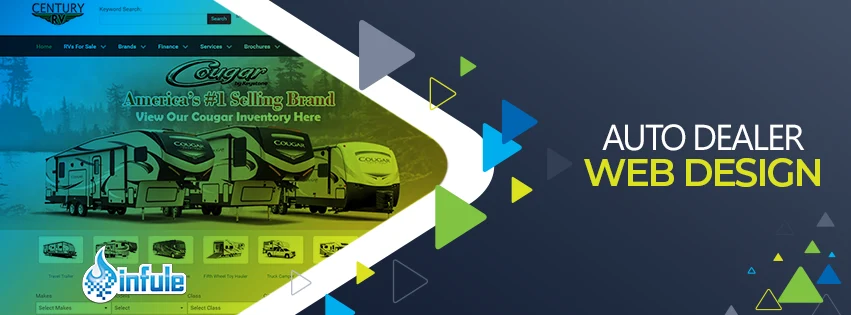
We’d Love to Hear From You
If you have any questions, comments, or would like to discuss any of the topics covered in this article, please comment below.